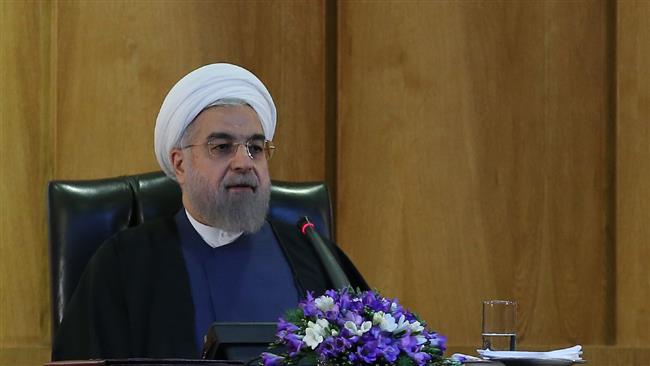Iranian President Hassan Rouhani says the country favors a “win-win” nuclear deal with the P5+1 states, expressing hope that Tehran’s negotiating sides would show the necessary political resolve for the settlement of the nuclear case.
Addressing foreign diplomats and ambassadors in Tehran on Tuesday evening, Rouhani said the Islamic Republic “has always believed in a win-win accord for the nuclear issue, and is still emphasizing such an agreement.”
“The Islamic Republic of Iran has exhibited the necessary flexibility in resolving the [nuclear] issue politically, and we hope that our negotiating sides would also show the required political will more than before to settle this issue,” added the Iranian president.
Rouhani further stated that Iran’s foreign policy has its roots in constructive interaction with the word, adding that Tehran’s relations with other countries, including with its neighbors, have improved under such an approach.
“Given the nuclear dossier, we have also managed to direct the negotiations to be constructive, and put the case on the track of…clinching an agreement between the two sides,” he pointed out.
Security threats in Middle East
President Rouhani also lambasted the spread of insecurity across the Middle East, blaming foreign interventions for the growth of the scourge.
“We believe that all regional countries should help each other for the sake of the region’s development, stability and security,” he said.
The Iranian president further mentioned intervention of foreign powers in the region’s affairs as one of the reasons behind rampant instability, adding that poverty together with low scientific progress and weak planning have also pushed the region to towards instability.
West should take goodwill measures to Strike nuclear deal with Iran, says Zarif
 Iranian Foreign Minister Mohammad Javad Zarif underlined that the nuclear talks between Tehran and the world powers will end in a final agreement if the western powers stop seeking excuses and reciprocate Iran’s goodwill measures.
Iranian Foreign Minister Mohammad Javad Zarif underlined that the nuclear talks between Tehran and the world powers will end in a final agreement if the western powers stop seeking excuses and reciprocate Iran’s goodwill measures.
“Iran has entered the negotiations with good will and strong determination and it emphasizes on its logical principles and criteria and if the other side also takes goodwill measures we can strike a (final) deal,” Zarif said in a meeting with Indian National Security Advisor Ajit Kumar Doval in Tehran on Tuesday.
He reiterated that Tehran has taken all the necessary actions for the success of the nuclear talks with the Group 5+1 (the US, Russia, China, Britain and France plus Germany), and said now it is the world powers’ turn to do so.
The Iranian foreign minister further pointed to the bilateral relations between Tehran and New Delhi, and said, “Development of Chabahar port as a strategic point is of paramount importance to Iran, Afghanistan, India and Central Asia, and the two countries are needed to cooperate on developing the port.”
The Indian national security advisor, for his part, pointed to the importance of the development of Chabahar port’s infrastructures and its benefits for the regional countries, and said, “In addition to cooperation in Chabahar port, India is also interested in cooperation with Iran in the energy and industry sectors.”
He also underlined the need for widening the two nations’ cooperation in fighting extremism and terrorism.
West seeks to bargain in Iran nuclear talks, says Larijani
 Meanwhile, Iranian Parliament (Majlis) Speaker Ali Larijani says some Western countries in the P5+1 group have mistaken the negotiating table for a place to bargain over Tehran’s nuclear energy program.
Meanwhile, Iranian Parliament (Majlis) Speaker Ali Larijani says some Western countries in the P5+1 group have mistaken the negotiating table for a place to bargain over Tehran’s nuclear energy program.
“Political negotiations over the [Iranian] nuclear issue can remove misunderstandings, but certain parties act like businessmen in the nuclear talks and seek bargaining. They even sometimes make absurd remarks,” Larijani said.
He made the comments at a gathering of foreign guests attending a ceremony marking the 36th anniversary of the victory of the Islamic Revolution.
Larijani said the West claims to have forced Iran to stop its nuclear development, but they should know that such rhetoric cannot solve their domestic problems. He also stressed that Iran will not abandon its peaceful nuclear program.
The West is mistaken to assume that they can use anti-Iran rhetoric to pile up pressure on the country in future nuclear negotiations, Larijani pointed out.
The senior Iranian official said that negotiations should provide a chance for logical solutions to issues.
Iran and the P5+1 group of countries – Russia, China, France, Britain, the US and Germany – are seeking to reach a high-level political agreement by April 1 and to confirm the full technical details of the accord by July 1.
Since an interim deal was sealed in the Swiss city of Geneva in November 2013, the negotiating sides have missed two self-imposed deadlines to ink a final comprehensive agreement over Tehran’s nuclear energy program.
PRESS T.V, FNA
R.S

